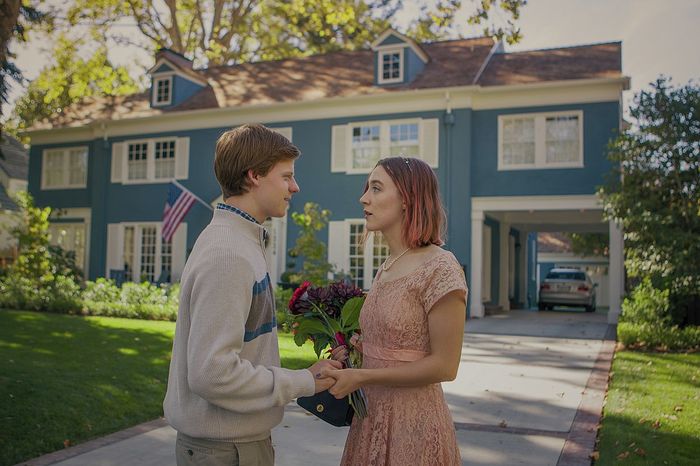Making memories with Past Lives
Celine Song’s debut uncovers a melancholic beauty in the road not taken

“If you leave something behind, you gain something too”. So muses a mother at the beginning of Past Lives, this gently affecting inaugural feature from writer-director Celine Song. Meanwhile, the camera turns to her young daughter, Na Young, and her best friend Hae Sung playing together, clambering over two large sculptures of human faces and laughing gleefully as they peer at each other through gaps in the stonework. These gaps seem to strangely foretell the spaces that are destined to open up between them – Na Young’s family are, after all, set to emigrate, leaving behind their life in Seoul for a new one in Toronto. For the ambitious Na Young, this seems to represent something of a moving-up in the world (“Koreans don’t win the Nobel Prize for literature!”, she quips). Yet, as we watch her ascend a long set of stairs, Hae Sung standing at the bottom, it’s made crushingly clear; there may be much to gain from leaving… but, in doing so, there’s perhaps even more that must inevitably be left behind.
Cut to a dozen years later, and Na Young now goes by the name of Nora (a superb Greta Lee). Though still yet to become a Nobel Laureate, she’s living in New York and set on becoming a playwright. Meanwhile, Hae Sung (Teo Yoo), now an almost forgotten memory to Nora (“What’s his name?”, she asks her mother, “the boy I had a massive crush on?”), has sought to get back into contact with his childhood sweetheart. The two reunite, albeit briefly – soon the obstacles of a modern long-distance relationship (the sacrifices you’ll make, the ones you won’t and, worst of all… Zoom glitches!) prove to be pretty insurmountable.
There’s a craftily employed reference around this point to Charlie Kaufman’s Eternal Sunshine of the Spotless Mind, which Hae Sung watches on Nora’s recommendation. Where Kaufman tells the story of two people so resentful of one another that they deliberately seek to erase the other person from their memory, Past Lives presents quite the opposite case; it could well be easier for both Nora and Hae Sung to forget about each other and move on with their lives – but their deep feelings of love, however quietly indicated, make that a difficult reality to imagine.
Another dozen years later, however, and Nora has done her best, marrying fellow writer Arthur (John Magaro). Things seem to be going swimmingly (he’s even tried his hand at some rudimentary Korean!), until Nora finds out that Hae Sung is taking a vacation to New York and wishes to see her. Thus opens a vast emotional chasm, from which outpours all the complications of love and loss, of diverging cultural identities, of memories half-forgotten and paths left untrodden.
“The milieu of everyday, streetside conversations between (not quite) lovers”
At points, I was reminded of another 2023 two-hander, Raine Allen-Miller’s romantic comedy Rye Lane, a very different film, but one just as fascinated by the milieu of everyday, streetside conversations between (not quite) lovers. Here, sunny South London locales and quickfire dialogue are swapped out for an overcast New York where, credit to Song’s exceptional restraint as a writer, as much is said in silence as in speech. Both Lee and Yoo capture an extraordinary depth of feeling in the minutiae of their facial expressions, as does Magaro, who quietly challenges whether the film can even be viewed as a two-hander in the first place.
In a moment of marital intimacy, Arthur confesses to Nora that a small part of him feels like the “evil white American husband”, standing in the way of her fairytale reunion with Hae Sung. Yet, Magaro and Song ensure that he is never relegated to such a position; Arthur is a fully-fledged, sympathetic character in his own right, grappling with his position in the complex cross-cultural game at play: “It’s like there’s this whole place inside of you where I can’t go”, he says, after admitting to Nora that she only speaks in Korean as she dreams – a beautiful moment.
“Both Lee and Yoo capture an extraordinary depth of feeling in the minutiae of their facial expressions”
If the film’s handling of the particular dynamics between its characters feels somewhat more fully-formed than its interest in diasporic identities more generally (Nora’s navigation of an increasing distance from her own origins with Hae Sung’s stringent “Koreanness” is an idea lightly suggested and just as lightly passed over), Song is clearly beguiled by the way in which different cultural understandings of such foundational concepts as time, fate, and providence, affect our outlook on the lives we have lived and, crucially, those we never got to experience. In fact, the very title of the film itself is rooted in the distinctly Korean idea of inyeon, the notion that a mysterious intertwining of our respective past lives might somehow play a part in bringing us closer together in a reincarnated present.
But there’s nothing naive about Past Lives, even in all its poetry; no hackneyed appeals towards grand romantic gestures or an idealistic belief in “soulmates”. We’re encouraged to see love much like Nora herself does, in all its difficult realities, its clashes and contradictions – it’s like “planting two trees in one pot”, she says, “our roots need to find their place”. Indeed, as Song leads us along the Hudson River towards an ending to remember, tears will surely be shed both on and off the screen… but perhaps we all need a little water to grow.
Past Lives releases in UK cinemas on the 8th of September 2023
 News / Cambridge postgrad re-elected as City councillor4 May 2024
News / Cambridge postgrad re-elected as City councillor4 May 2024 News / Gender attainment gap to be excluded from Cambridge access report3 May 2024
News / Gender attainment gap to be excluded from Cambridge access report3 May 2024 News / Some supervisors’ effective pay rate £3 below living wage, new report finds5 May 2024
News / Some supervisors’ effective pay rate £3 below living wage, new report finds5 May 2024 News / Academics call for Cambridge to drop investigation into ‘race realist’ fellow2 May 2024
News / Academics call for Cambridge to drop investigation into ‘race realist’ fellow2 May 2024 Comment / Accepting black people into Cambridge is not an act of discrimination3 May 2024
Comment / Accepting black people into Cambridge is not an act of discrimination3 May 2024






